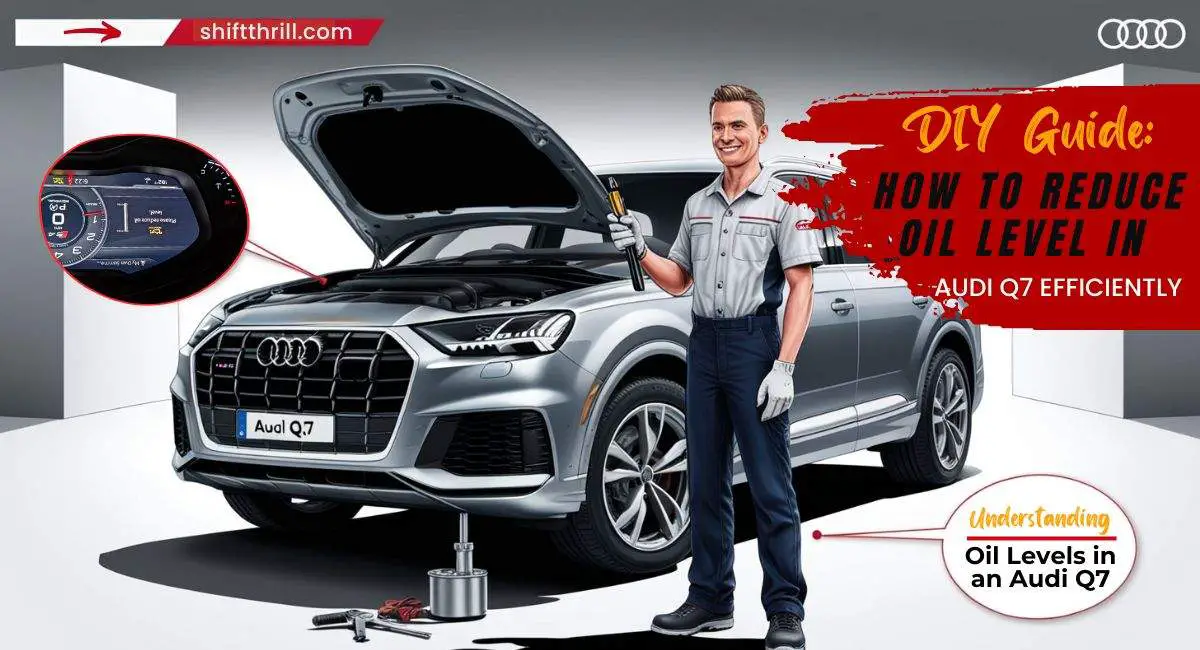Maintaining the proper oil level in your Audi Q7 is essential for ensuring optimal engine performance and longevity. Excess oil, often overlooked, can lead to engine damage, increased emissions, and even safety risks. This comprehensive guide walks you through reducing the oil level in your Audi Q7 efficiently, with a focus on safety, accuracy, and eco-friendliness.
Understanding Oil Levels in an Audi Q7
Why Proper Oil Levels Matter
Oil plays a critical role in the engine by lubricating moving parts, reducing friction, and dissipating heat. However, overfilling oil can:
- Increase internal pressure, potentially causing leaks in seals and gaskets.
- Cause oil foaming, which reduces lubrication efficiency.
- Contaminate the catalytic converter, leading to expensive repairs.
Signs of Overfilled Oil
- Unusual Engine Noises: Overfilled oil can cause strain on moving parts.
- White Smoke from the Exhaust: This indicates oil burning in the combustion chamber.
- Oil Smell: Excess oil may leak and burn on hot engine components.

How the Audi Q7’s Oil Monitoring System Works
The Audi Q7 features an advanced electronic oil monitoring system accessed via the Multi Media Interface (MMI). This system provides real-time oil level data, eliminating the need for traditional dipsticks in newer models.
Tools and Materials Needed
Essential Tools
- Oil drain pan
- Socket wrench or spanner
- Safety gloves and goggles
- Clean rags or paper towels
- Funnel
- Empty, sealed container for excess oil disposal
Optional Tools
- Oil extractor pump for easier and cleaner removal
- Torque wrench to avoid over-tightening the drain plug
Preparing Your Workspace
- Park on a level surface with adequate ventilation.
- Ensure the engine is cool before beginning.
How to Check Oil Levels in an Audi Q7
- Park on Level Ground: Ensure the vehicle is stable to get an accurate reading.
- Access the MMI System: Navigate to the car’s settings and select the oil level option.
- Interpreting the Reading: Follow the prompts to assess whether the oil level is within the recommended range.
- When to Check: Regularly inspect oil levels before long trips and during routine maintenance. Sudden changes in oil levels may indicate leaks or other issues.
Step-by-Step Guide to Reducing Oil Level
Preparation
- Wear safety gloves and goggles.
- Identify the recommended oil capacity for your Audi Q7 in the owner’s manual.
Method 1: Draining Oil from the Drain Plug
- Locate the Drain Plug: Found underneath the vehicle, usually at the oil pan.
- Position the Drain Pan: Place it beneath the drain plug to collect excess oil.
- Loosen the Plug: Use a wrench to carefully unscrew the drain plug. Release small amounts of oil at a time.
- Recheck Oil Level: Tighten the plug securely and check the level using the MMI system or dipstick.
- Dispose of Oil Properly: Transfer drained oil into a sealed container for recycling.
Method 2: Using an Oil Extractor Pump
- Insert the Extractor Tube: Connect the pump tube to the dipstick tube or designated port.
- Pump to Remove Oil: Gradually extract oil in small increments.
- Monitor Levels: Periodically check the oil level to avoid over-draining.
- Secure and Clean Up: Ensure all connections are tightened and clean any spills.
Risks of Excess Oil and the Importance of Immediate Action
Engine Damage Risks
Excess oil creates pressure that can damage seals and gaskets, leading to costly repairs. It may also cause oil to enter the combustion chamber, reducing performance.
Impact on Emissions
Burning excess oil produces harmful emissions and can damage the catalytic converter. This increases your vehicle’s environmental footprint and may result in failing emissions tests.
Performance Issues
Too much oil increases drag on engine components, reducing fuel efficiency and overall performance.
Common Mistakes to Avoid
- Over-Draining Oil: Removing too much oil can lead to insufficient lubrication, causing engine wear.
- Ignoring Warning Lights: Always investigate oil-related warnings promptly.
- Improperly Securing Drain Plug: Ensure the plug is tightened but not over-torqued.
- Spillage Hazards: Clean up spills immediately to prevent accidents.
Maintenance Tips to Prevent Overfilling
- Accurate Oil Changes: Follow manufacturer’s guidelines for oil type and quantity.
- Routine Inspections: Regularly check oil levels and look for leaks.
- Preventive Measures: Avoid topping off oil unnecessarily between changes.
Environmental and Legal Considerations
Proper Disposal of Excess Oil
- Take used oil to certified recycling centers or auto shops.
- Avoid disposing of oil in drains, as it contaminates water sources.
Environmental Hazards
Improper disposal can lead to severe environmental damage, affecting soil and water systems. Always use sealed containers for transport.
Frequently Asked Questions (FAQs)
1. What causes overfilled oil?
Overfilling during changes or topping off too frequently.
2. How much oil should I drain?
Typically, drain in small increments (50-100 ml) and recheck levels.
3. Can excess oil trigger warning lights?
Yes, it may activate oil pressure or engine check warnings.
4. What should I do if I remove too much oil?
Add small amounts of the correct oil type until the level is optimal.
5. How often should I check oil levels?
At least once a month or before long journeys.
Future Innovations in Oil Management
Smart Oil Monitoring Systems
Modern vehicles, including the Audi Q7, are integrating advanced oil sensors for real-time monitoring. These systems can provide predictive maintenance alerts, ensuring optimal oil management.
Eco-Friendly Oil Solutions
Developments in biodegradable and long-lasting synthetic oils aim to reduce waste and environmental impact.
Conclusion
Maintaining the correct oil level in your Audi Q7 is crucial for its performance, efficiency, and longevity. By following this guide, you can safely reduce excess oil levels while avoiding potential engine damage and environmental harm. Regular maintenance and mindful practices will keep your vehicle running smoothly for years to come.
